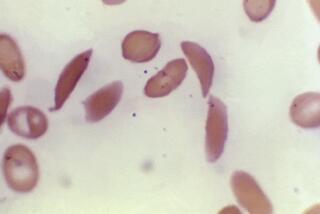Leukemia Drug Use for Sickle Cell Disease Seen
A widely used leukemia drug is showing promise as a treatment for sickle cell disease, the genetic blood disorder that afflicts an estimated 50,000 black Americans and has so far defied all attempts at effective treatment.
In a preliminary study published in today’s issue of the New England Journal of Medicine, scientists from the National Institutes of Health report seven of 10 severely affected sickle cell patients treated with the drug, called hydroxyurea, showed significant improvements.
“At this point we wouldn’t suggest it as a general treatment for sickle cell disease,” said a National Institute of Diabetes and Digestive and Kidney Diseases investigator.
Sickle cell disease is the result of a genetic defect that leads the body to make abnormal forms of hemoglobin, the oxygen-carrying molecules in red blood cells. In stressful situations, the normally round shape of the blood cells is distorted into sickle, or crescent, shapes that clog up in blood vessels.
What hydroxyurea appears to do is to turn genes for making a different form of hemoglobin on at full blast, giving sickle cell sufferers a second source of hemoglobin.






